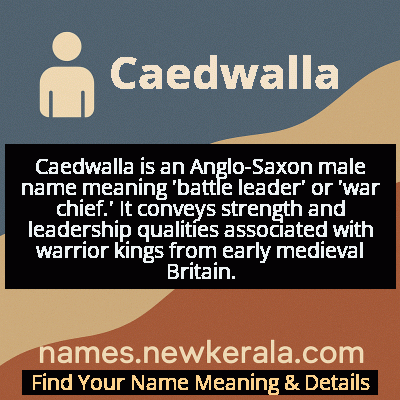Caedwalla Name Meaning & Details
Origin, Popularity, Numerology Analysis & Name Meaning of Caedwalla
Discover the origin, meaning, and cultural significance of the name CAEDWALLA. Delve into its historical roots and explore the lasting impact it has had on communities and traditions.
Name
Caedwalla
Gender
Male
Origin
Anglo
Lucky Number
8
Meaning of the Name - Caedwalla
Caedwalla is an Anglo-Saxon male name meaning 'battle leader' or 'war chief.' It conveys strength and leadership qualities associated with warrior kings from early medieval Britain.
Caedwalla - Complete Numerology Analysis
Your Numerology Number
Based on Pythagorean Numerology System
Ruling Planet
Saturn
Positive Nature
Ambitious, efficient, realistic, and authoritative.
Negative Traits
Materialistic, stressed, confrontational, and can be overly ambitious.
Lucky Colours
Dark blue, black.
Lucky Days
Saturday.
Lucky Stones
Blue sapphire, amethyst.
Harmony Numbers
2, 4, 6.
Best Suited Professions
Business leaders, managers, financial services, law enforcement.
What People Like About You
Leadership, determination, organizational skills.
Famous People Named Caedwalla
Caedwalla of Wessex
Anglo-Saxon King
Conquered Sussex and Isle of Wight, abdicated for pilgrimage to Rome, baptized by Pope Sergius I
Caedwalla ap Cadfan
Welsh King
Led Welsh resistance against Northumbrian expansion, significant military campaigns in 7th century Britain
Caedwalla of Lindsey
Anglo-Saxon Noble
Influential regional leader known for diplomacy and military leadership in early medieval England
Name Variations & International Equivalents
Click on blue names to explore their detailed meanings. Gray names with will be available soon.
Cultural & Historical Significance
The name also reflects the ongoing cultural synthesis between the native British populations and incoming Anglo-Saxon settlers. As a name used by both Welsh and Anglo-Saxon rulers, it symbolizes the blurred boundaries and shared aristocratic culture that existed despite political conflicts. The historical significance extends to understanding how early medieval British identity was formed through such cultural interactions, where names and traditions were adopted and adapted across ethnic lines. Caedwalla's story particularly illustrates how personal spiritual journeys became intertwined with political leadership during Christianity's establishment in England.
Extended Personality Analysis
Individuals named Caedwalla typically exhibit strong leadership qualities combined with strategic intelligence and determined willpower. They are natural commanders who inspire loyalty through both their courage and their vision, often demonstrating remarkable persistence in pursuing their goals. These personalities balance martial capability with diplomatic skill, understanding when to employ force and when to negotiate. Their character is marked by a deep sense of honor and responsibility, though they can be intensely ambitious and sometimes ruthless when confronting obstacles. The historical associations suggest individuals who are not merely warriors but thinkers, capable of complex planning and adaptation to changing circumstances.
Beyond their formidable external qualities, those named Caedwalla often possess significant depth and capacity for personal transformation. They tend to be reflective individuals who, despite their worldly achievements, may undergo profound spiritual or philosophical evolution throughout their lives. This combination of outer strength and inner searching creates multidimensional personalities who command respect while also demonstrating vulnerability and growth. Their leadership style typically evolves from raw ambition to more principled governance, reflecting the historical narrative of the name's most famous bearer who transitioned from conqueror to pilgrim. This capacity for change and self-reflection makes them compelling, if complex, figures in any context.
Modern Usage & Popularity
In contemporary naming practices, Caedwalla remains extremely rare and is primarily used by families with specific historical interests or cultural connections to Anglo-Saxon or Welsh heritage. The name has never appeared on modern popularity charts and maintains a highly specialized status, mostly confined to the United Kingdom and particularly regions with strong medieval historical consciousness. Its usage is often motivated by a desire to preserve cultural heritage or make a statement about historical identity. Some parents opt for simplified variations like Cadwal or Cadwallon to make the name slightly more accessible while retaining its historical resonance. The name's complexity, unusual sound, and strong association with a specific historical period limit its widespread adoption, but it continues to be valued within academic circles, historical reenactment communities, and families with deep roots in British history.
Symbolic & Spiritual Meanings
Symbolically, Caedwalla represents the archetype of the warrior-king transformed into spiritual seeker, embodying the journey from earthly power to higher understanding. The name carries deep metaphorical significance as a bridge between cultures—specifically the Celtic and Germanic traditions that shaped early medieval Britain. It symbolizes cultural synthesis and the creation of new identities from diverse influences. The historical narrative associated with the name suggests themes of redemption, personal transformation, and the recognition that true power extends beyond military conquest to spiritual enlightenment. Metaphorically, Caedwalla represents the integration of opposing forces: strength and compassion, action and reflection, tradition and innovation. The name also symbolizes the complex nature of leadership that evolves from mere authority to genuine service, reflecting the historical figure's journey from conqueror to pilgrim. This rich symbolic tapestry makes the name meaningful beyond its historical context, representing universal themes of growth, reconciliation, and the search for deeper purpose.

